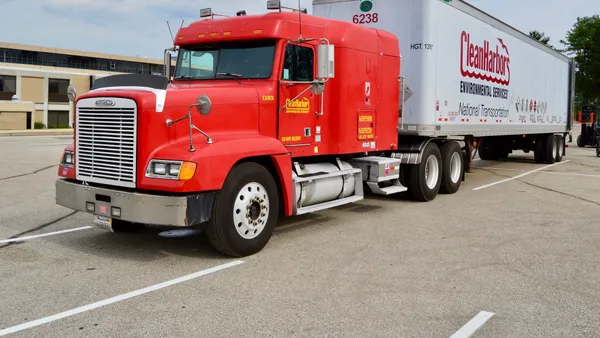UPDATE: Waste Dive has updated this story to clarify how long the Lorton, VA facility will be closed. According to Covanta's James Regan, the company is "completing inspections and starting some repairs" with intentions to restart operations in the near future.
Dive Brief:
- The Covanta Fairfax waste-to-energy facility in Lorton, VA has been shut down due to a large two-alarm fire that burned for multiple days in its waste storage pit, as reported by Fairfax County and NBC Washington.
- The fire began on the night of Feb. 2 in the facility's tipping floor, which can handle up to 3,000 tons of waste per day. A team of 60 firefighters from Fairfax County ultimately gained control over the fire on Friday and are working to check for any remaining hotspots. The cause of the fire is still unknown.
- The facility didn't process any hazardous waste and no harmful emissions have been reported. According to a notice posted by Fairfax County, waste collection services will not be interrupted as a result of the fire.
Dive Insight:
This particular facility has been operational for nearly 27 years and serves a large amount of residents in suburban areas outside Washington D.C. According to James Regan, Covanta's director of communications and media relations, damage was contained to the storage pit and all facility systems are still intact. Regan told Waste Dive that repairs will begin as soon as possible and operations are expected to resume "within the coming weeks."
The nearby Montgomery County Resource Recovery Facility in Maryland, operated by Covanta, also experienced a fire in December that took longer to fully extinguish. Regan said that the closeness of these events was coincidental and Covanta is using all of the lessons it learned in that situation to deal with the damage at Fairfax. The company is working to update its policies on preventing and responding to fires, including educating residents about keeping potentially hazardous items out of their waste bins.
Facility fires of varying sizes are fairly common when dealing with waste, and can often be mitigated with the right systems in place, though are unpredictable by nature. One recent model is a partnership that British industry groups are working on with the U.K.'s Environment Agency to develop fire prevention guidelines. No comparable program has been adopted in the U.S.










